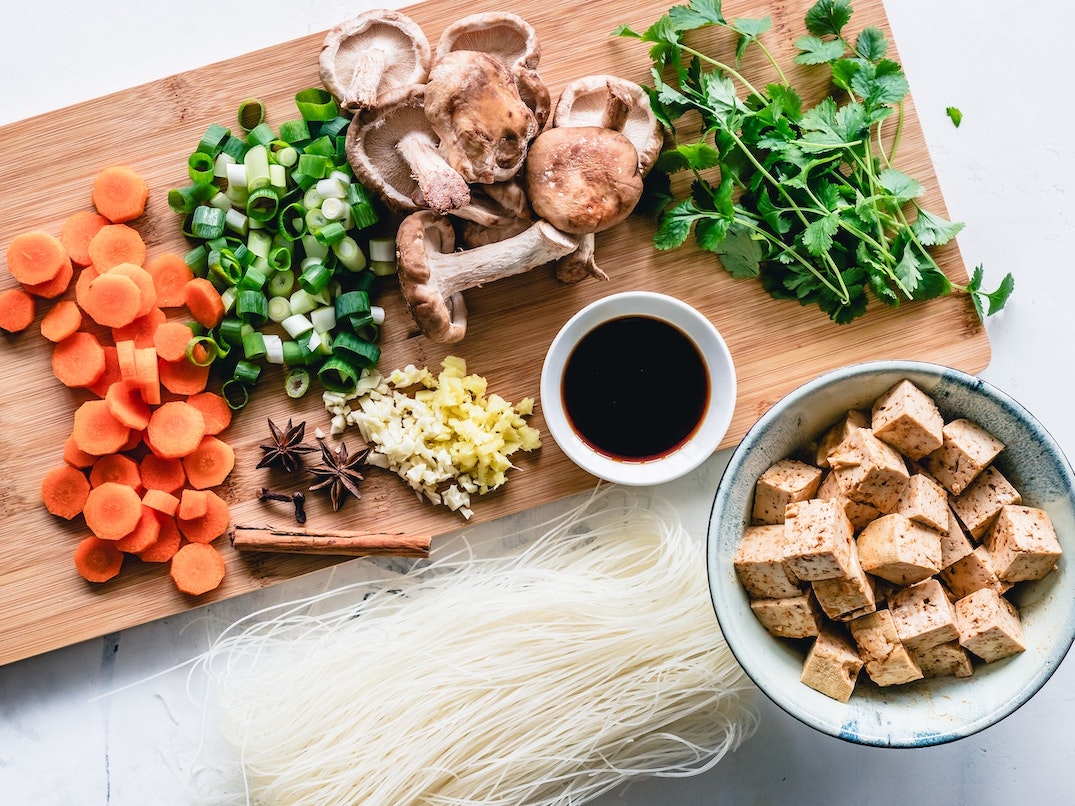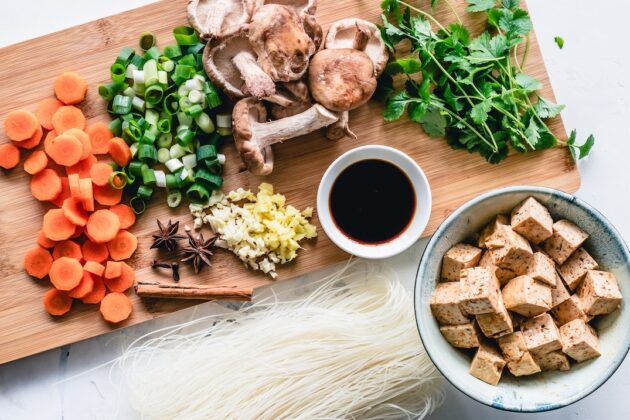Alkaline Foods & Diet for GERD (Acid Reflux & Heartburn)
Gastroesophageal Reflux Disease (GERD) is a common condition where stomach acid flows back up your esophagus. This happens when the muscle between the esophagus and the stomach does not work as it should, allowing stomach acid to travel up the esophagus.
This causes heartburn, a burning sensation in your chest. Other symptoms include regurgitation, bitter taste, belching, nausea, dry cough and pain while swallowing. These symptoms can be very uncomfortable and easily interrupt your day.
Several diets have been studied for managing GERD symptoms, including the alkaline diet. All foods have a number on the pH scale, which indicates acid levels. Acidic foods have a low number on the scale while alkaline foods have a high number. The alkaline diet consists of mostly alkaline foods.
The alkaline diet does not allow acid-forming foods like meat, fish, dairy, eggs, grains, and alcohol to avoid triggering GERD symptoms. While on this diet, you will consume mostly nuts, legumes, and most fruits and vegetables, which are all alkaline foods.
Because acid foods often trigger GERD symptoms, it is thought that consuming mostly alkaline foods will prevent symptoms. While more research is needed on the efficacy of the alkaline diet for GERD, some people may find it beneficial to focus more on alkaline foods and avoid more acidic foods.
This guide goes over the best alkaline foods to help with acid reflux and heartburn, as well as acidic foods to avoid.
Best alkaline foods for acid reflux & heartburn
One benefit of the alkaline diet is that it consists mostly of whole, unprocessed foods, which is good for your overall health.
If you are considering this diet, or any other diet to help GERD, be sure to consult your doctor, dietitian, or other healthcare providers before making drastic changes as it may not be for everyone.
Alkaline foods that may help prevent acid reflux and heartburn include, but are not limited to:
- Bananas. Bananas are a low-acid, high-fiber fruit that are relatively easy to digest. This means they move through the stomach quickly, which can prevent acid reflux.
- Melons. Cantaloupe, honeydew, and watermelon are all alkaline fruits that also have a high water content. This can help neutralize stomach acid.
- Apples. Red apples contain a high amount of fiber and water. In addition, apples contain antioxidants to help fight inflammation. This may be beneficial to prevent inflammation in the esophagus.
- Broccoli. In addition to being a low-acid vegetable, broccoli contains a variety of nutrients. Broccoli is high in vitamin C, which is a powerful antioxidant to reduce inflammation. Broccoli also contains a small amount of calcium, which is known to help neutralize stomach acid.
- Cauliflower. Similar to broccoli, cauliflower is an alkaline vegetable that contains other beneficial nutrients for health, like vitamin C and fiber.
- Oatmeal. Oats are considered mildly acidic or neutral. While they are not necessarily considered an alkaline food, most people with GERD tolerate oatmeal because of its high fiber content. Research has shown links between increased dietary fiber and reduced symptoms of GERD.
- Green leafy vegetables. Green leafy vegetables, such as spinach, kale, arugula, bok choy, and collard greens contain a variety of vitamins and minerals. They are high in fiber and water, which can both improve acid reflux. Learn about how eating a vegan/vegetarian diet impacts GERD here.
- Fennel. This vegetable is well known as a digestive aid and is used to help treat indigestion, which has similar symptoms to acid reflux. Fennel also contains powerful antioxidants and is rich in fiber. While research has not proven this, some people believe chewing fennel seeds or drinking fennel tea helps soothe acid reflux.
- Nuts and seeds. Nuts and seeds contain healthy fats, which will less likely cause acid reflux compared to unhealthy fats from processed or fried foods. Nuts and seeds also contain some protein, which can be hard to get enough of while following the alkaline diet. Enjoy a small handful of almonds, walnuts, cashews, or pistachios in moderation, or add some flaxseed or chia seeds to oatmeal and smoothies.
- Tofu. Because a lot of high-protein foods, like meat and dairy, are avoided on the alkaline diet, eating tofu can help you get adequate protein every day. Not only is it a lean protein source, but it is also rich in calcium, which can help prevent acid reflux.
- Celery. Celery contains mostly water and fiber, which can help alleviate acid reflux. Some people even use celery juice to treat heartburn and acid reflux, although there is no evidence to prove this.

Get professional help managing acid reflux & heartburn
90% of Zaya Care patients pay $0 for visits with a Registered Dietitian
Acidic foods that can cause acid reflux & heartburn
While alkaline foods may prevent symptoms of GERD, acidic foods may do the opposite. Acidic foods, like those listed below, are common triggers of acid reflux and heartburn.
- Citrus fruits and juices. Oranges, grapefruit, lemons, and limes are all highly acidic fruits. Consuming these fruits and their juices can irritate the esophagus and aggravate symptoms of acid reflux.
- Tomatoes and tomato-based products. Tomatoes and tomato products, such as marinara sauce, ketchup, tomato soup, and salsa all contain high amounts of acid. These products are common triggers for heartburn.
- Spicy foods. Spicy foods almost always trigger or worsen heartburn because they can irritate the lining of the esophagus. Individual tolerance may vary, but it is best to avoid foods with hot sauce, cayenne pepper, chiles, black pepper, and jalapenos.
- Onions. There is a clear link between consuming onions and acid reflux. Onions, especially raw, are a common trigger for heartburn because they are acidic. While cooking onions may slightly decrease the acidity, they should be avoided as much as possible to prevent heartburn.
- Chocolate. The cocoa powder in chocolate is acidic. Chocolate also contains caffeine, which may trigger heartburn for some people.
- Mint. Peppermint is a common trigger for heartburn. It has been shown to relax the lower esophageal sphincter (the muscle between the esophagus and the stomach), which allows for stomach acid to travel back up the esophagus.
- Fatty and fried foods. Fried and fatty foods are not only acidic, but they also take a long time to digest. When your stomach stays full for a long period of time, acid production increases, which increases the risk of heartburn. Try to avoid foods like cheeseburgers, french fries, bacon, fried chicken, potato chips, doughnuts, and more.
- Caffeinated beverages. Coffee and some teas, especially black tea and fruit teas, are considered acidic. Better tea options with higher pH include fennel tea, chamomile tea, and green tea.
- Alcohol. Most wine, beer, and hard liquor have a low pH. Heavy drinking almost always worsens symptoms of GERD. Some studies have shown that alcohol may cause damage to your esophagus. If possible, it is best to avoid alcohol if you have GERD.
- Carbonated beverages. The acidity and carbonation of sodas, energy drinks, and sparkling water can cause heartburn and other symptoms like bloating and belching. Instead, choose flavored water that is not carbonated.
>> Find an Acid Reflux & Heartburn Nutritionist That Accepts Your Insurance
Example alkaline diet for GERD
Here is an example 1,800-calorie alkaline diet that may help with GERD. Note that this is just a sample diet and your needs may be different based on your personal situation. It’s always important to talk to your doctor or dietitian before making any drastic diet changes.
Breakfast
Green Power Smoothie
- 1 cup fresh spinach
- 1 ripe banana
- 1/2 avocado
- 1 tbsp flaxseeds
- 1 cup almond milk
Total calories: ~400
Lunch
Quinoa Veggie Bowl
- 1 cup cooked quinoa
- 1/2 cup roasted bell peppers
- 1/2 cup steamed broccoli
- 1/4 cup diced cucumber
- 2 tbsp tahini dressing
Total calories: ~500
Afternoon Snack
Alkaline Booster
- 15 raw almonds
- 1 cup carrot sticks
Total calories: ~200
Dinner
Baked Salmon with Alkaline Veggies
- 4 oz salmon
- 1 cup of steamed kale
- 1/2 cup of roasted sweet potato
- 1 tbsp olive oil
Total calories: ~500
Snack
Berry Banana Bliss
- 1 cup mixed berries (strawberries, blueberries, raspberries)
- 1 ripe banana
Total calories: ~200
Hydration
Throughout the day: Alkaline Water and Herbal Tea
- At least 8 cups of alkaline water
- 1-2 cups of herbal tea (such as chamomile or peppermint)

Get professional help managing acid reflux & heartburn
90% of Zaya Care patients pay $0 for visits with a Registered Dietitian
Other diet-related home remedies for heartburn and acid reflux
Even if you are eating an alkaline diet for GERD, there may still be times you need relief from acid reflux and heartburn. Here are some other natural home remedies and tips that may help with those issues:
- Drink plenty of water. Drinking a lot of water each day can help dilute acid and flush out the esophagus. Water is also a neutral liquid, which can counteract acidic foods.
- Drink baking soda and water. Because baking soda in water creates an alkaline solution, it is often used to neutralize excess stomach acid. This is often used as an immediate relief for heartburn.
- Chew gum. Chewing gum produces more saliva, which causes you to swallow more. This can help clear the esophagus.
- Use aloe vera juice. In a pilot study, aloe vera syrup was identified as a safe method to reduce heartburn, nausea, and food regurgitation. Aloe vera also contains anti-inflammatory properties, which may benefit symptoms of GERD.
- Drink apple cider vinegar and water. Although there is little evidence to confirm that apple cider vinegar and water is a safe and effective method for heartburn and acid reflux, many people use it as a natural remedy for quick relief.
- Eat plain yogurt or other probiotic-rich foods. Probiotics are well known for their benefits to gut health. In a systematic review of 13 studies, it was concluded that probiotic foods can be beneficial for GERD symptoms. Adding probiotic-rich foods like kefir, kimchi, and sauerkraut to your diet may help reduce heartburn and acid reflux.
- Take an antacid. Antacids can be used as a quick relief for heartburn. Antacids counteract the acidity in your stomach, which helps alleviate acid reflux.
- Consider supplementation. There are various supplements that can help with GERD, acid reflux, and heartburn. Like with your diet, consult with your doctor or nutritionist before starting any new supplements.
>> Another Resource: Printable 7-Day GERD Diet Plan PDF
Why you should consider working with a GERD nutritionist
Following an alkaline diet can be difficult to do because of all of the food restrictions. A GERD nutritionist can provide you with the expert guidance and support you need to manage heartburn and acid reflux through diet while meeting your nutrition needs.
Because the alkaline diet avoids meat and dairy, you may miss out on protein and other important nutrients. As a trained professional, a GERD nutritionist will help you find the best alternatives to help you consume adequate protein and other key nutrients each day.
A GERD nutritionist will get to know your preferences, tolerances, and current diet habits to develop a personalized plan of action for you. This will also help you become more confident in making the right food decisions to keep your symptoms under control.
Here at Zaya Care, we can match you with GERD nutritionists that are covered by your insurance. You can browse our network of nutritionists and filter by things like visit type, languages spoken, insurance accepted, and more to find your fit.

Get professional help managing acid reflux & heartburn
90% of Zaya Care patients pay $0 for visits with a Registered Dietitian
Gastroesophageal Reflux Disease (GERD) is a common condition where stomach acid flows back up your esophagus. This happens when the muscle between the esophagus and the stomach does not work as it should, allowing stomach acid to travel up the esophagus.
This causes heartburn, a burning sensation in your chest. Other symptoms include regurgitation, bitter taste, belching, nausea, dry cough and pain while swallowing. These symptoms can be very uncomfortable and easily interrupt your day.
Several diets have been studied for managing GERD symptoms, including the alkaline diet. All foods have a number on the pH scale, which indicates acid levels. Acidic foods have a low number on the scale while alkaline foods have a high number. The alkaline diet consists of mostly alkaline foods.
The alkaline diet does not allow acid-forming foods like meat, fish, dairy, eggs, grains, and alcohol to avoid triggering GERD symptoms. While on this diet, you will consume mostly nuts, legumes, and most fruits and vegetables, which are all alkaline foods.
Because acid foods often trigger GERD symptoms, it is thought that consuming mostly alkaline foods will prevent symptoms. While more research is needed on the efficacy of the alkaline diet for GERD, some people may find it beneficial to focus more on alkaline foods and avoid more acidic foods.
This guide goes over the best alkaline foods to help with acid reflux and heartburn, as well as acidic foods to avoid.
Best alkaline foods for acid reflux & heartburn
One benefit of the alkaline diet is that it consists mostly of whole, unprocessed foods, which is good for your overall health.
If you are considering this diet, or any other diet to help GERD, be sure to consult your doctor, dietitian, or other healthcare providers before making drastic changes as it may not be for everyone.
Alkaline foods that may help prevent acid reflux and heartburn include, but are not limited to:
- Bananas. Bananas are a low-acid, high-fiber fruit that are relatively easy to digest. This means they move through the stomach quickly, which can prevent acid reflux.
- Melons. Cantaloupe, honeydew, and watermelon are all alkaline fruits that also have a high water content. This can help neutralize stomach acid.
- Apples. Red apples contain a high amount of fiber and water. In addition, apples contain antioxidants to help fight inflammation. This may be beneficial to prevent inflammation in the esophagus.
- Broccoli. In addition to being a low-acid vegetable, broccoli contains a variety of nutrients. Broccoli is high in vitamin C, which is a powerful antioxidant to reduce inflammation. Broccoli also contains a small amount of calcium, which is known to help neutralize stomach acid.
- Cauliflower. Similar to broccoli, cauliflower is an alkaline vegetable that contains other beneficial nutrients for health, like vitamin C and fiber.
- Oatmeal. Oats are considered mildly acidic or neutral. While they are not necessarily considered an alkaline food, most people with GERD tolerate oatmeal because of its high fiber content. Research has shown links between increased dietary fiber and reduced symptoms of GERD.
- Green leafy vegetables. Green leafy vegetables, such as spinach, kale, arugula, bok choy, and collard greens contain a variety of vitamins and minerals. They are high in fiber and water, which can both improve acid reflux. Learn about how eating a vegan/vegetarian diet impacts GERD here.
- Fennel. This vegetable is well known as a digestive aid and is used to help treat indigestion, which has similar symptoms to acid reflux. Fennel also contains powerful antioxidants and is rich in fiber. While research has not proven this, some people believe chewing fennel seeds or drinking fennel tea helps soothe acid reflux.
- Nuts and seeds. Nuts and seeds contain healthy fats, which will less likely cause acid reflux compared to unhealthy fats from processed or fried foods. Nuts and seeds also contain some protein, which can be hard to get enough of while following the alkaline diet. Enjoy a small handful of almonds, walnuts, cashews, or pistachios in moderation, or add some flaxseed or chia seeds to oatmeal and smoothies.
- Tofu. Because a lot of high-protein foods, like meat and dairy, are avoided on the alkaline diet, eating tofu can help you get adequate protein every day. Not only is it a lean protein source, but it is also rich in calcium, which can help prevent acid reflux.
- Celery. Celery contains mostly water and fiber, which can help alleviate acid reflux. Some people even use celery juice to treat heartburn and acid reflux, although there is no evidence to prove this.

Get professional help managing acid reflux & heartburn
90% of Zaya Care patients pay $0 for visits with a Registered Dietitian
Acidic foods that can cause acid reflux & heartburn
While alkaline foods may prevent symptoms of GERD, acidic foods may do the opposite. Acidic foods, like those listed below, are common triggers of acid reflux and heartburn.
- Citrus fruits and juices. Oranges, grapefruit, lemons, and limes are all highly acidic fruits. Consuming these fruits and their juices can irritate the esophagus and aggravate symptoms of acid reflux.
- Tomatoes and tomato-based products. Tomatoes and tomato products, such as marinara sauce, ketchup, tomato soup, and salsa all contain high amounts of acid. These products are common triggers for heartburn.
- Spicy foods. Spicy foods almost always trigger or worsen heartburn because they can irritate the lining of the esophagus. Individual tolerance may vary, but it is best to avoid foods with hot sauce, cayenne pepper, chiles, black pepper, and jalapenos.
- Onions. There is a clear link between consuming onions and acid reflux. Onions, especially raw, are a common trigger for heartburn because they are acidic. While cooking onions may slightly decrease the acidity, they should be avoided as much as possible to prevent heartburn.
- Chocolate. The cocoa powder in chocolate is acidic. Chocolate also contains caffeine, which may trigger heartburn for some people.
- Mint. Peppermint is a common trigger for heartburn. It has been shown to relax the lower esophageal sphincter (the muscle between the esophagus and the stomach), which allows for stomach acid to travel back up the esophagus.
- Fatty and fried foods. Fried and fatty foods are not only acidic, but they also take a long time to digest. When your stomach stays full for a long period of time, acid production increases, which increases the risk of heartburn. Try to avoid foods like cheeseburgers, french fries, bacon, fried chicken, potato chips, doughnuts, and more.
- Caffeinated beverages. Coffee and some teas, especially black tea and fruit teas, are considered acidic. Better tea options with higher pH include fennel tea, chamomile tea, and green tea.
- Alcohol. Most wine, beer, and hard liquor have a low pH. Heavy drinking almost always worsens symptoms of GERD. Some studies have shown that alcohol may cause damage to your esophagus. If possible, it is best to avoid alcohol if you have GERD.
- Carbonated beverages. The acidity and carbonation of sodas, energy drinks, and sparkling water can cause heartburn and other symptoms like bloating and belching. Instead, choose flavored water that is not carbonated.
>> Find an Acid Reflux & Heartburn Nutritionist That Accepts Your Insurance
Example alkaline diet for GERD
Here is an example 1,800-calorie alkaline diet that may help with GERD. Note that this is just a sample diet and your needs may be different based on your personal situation. It’s always important to talk to your doctor or dietitian before making any drastic diet changes.
Breakfast
Green Power Smoothie
- 1 cup fresh spinach
- 1 ripe banana
- 1/2 avocado
- 1 tbsp flaxseeds
- 1 cup almond milk
Total calories: ~400
Lunch
Quinoa Veggie Bowl
- 1 cup cooked quinoa
- 1/2 cup roasted bell peppers
- 1/2 cup steamed broccoli
- 1/4 cup diced cucumber
- 2 tbsp tahini dressing
Total calories: ~500
Afternoon Snack
Alkaline Booster
- 15 raw almonds
- 1 cup carrot sticks
Total calories: ~200
Dinner
Baked Salmon with Alkaline Veggies
- 4 oz salmon
- 1 cup of steamed kale
- 1/2 cup of roasted sweet potato
- 1 tbsp olive oil
Total calories: ~500
Snack
Berry Banana Bliss
- 1 cup mixed berries (strawberries, blueberries, raspberries)
- 1 ripe banana
Total calories: ~200
Hydration
Throughout the day: Alkaline Water and Herbal Tea
- At least 8 cups of alkaline water
- 1-2 cups of herbal tea (such as chamomile or peppermint)

Get professional help managing acid reflux & heartburn
90% of Zaya Care patients pay $0 for visits with a Registered Dietitian
Other diet-related home remedies for heartburn and acid reflux
Even if you are eating an alkaline diet for GERD, there may still be times you need relief from acid reflux and heartburn. Here are some other natural home remedies and tips that may help with those issues:
- Drink plenty of water. Drinking a lot of water each day can help dilute acid and flush out the esophagus. Water is also a neutral liquid, which can counteract acidic foods.
- Drink baking soda and water. Because baking soda in water creates an alkaline solution, it is often used to neutralize excess stomach acid. This is often used as an immediate relief for heartburn.
- Chew gum. Chewing gum produces more saliva, which causes you to swallow more. This can help clear the esophagus.
- Use aloe vera juice. In a pilot study, aloe vera syrup was identified as a safe method to reduce heartburn, nausea, and food regurgitation. Aloe vera also contains anti-inflammatory properties, which may benefit symptoms of GERD.
- Drink apple cider vinegar and water. Although there is little evidence to confirm that apple cider vinegar and water is a safe and effective method for heartburn and acid reflux, many people use it as a natural remedy for quick relief.
- Eat plain yogurt or other probiotic-rich foods. Probiotics are well known for their benefits to gut health. In a systematic review of 13 studies, it was concluded that probiotic foods can be beneficial for GERD symptoms. Adding probiotic-rich foods like kefir, kimchi, and sauerkraut to your diet may help reduce heartburn and acid reflux.
- Take an antacid. Antacids can be used as a quick relief for heartburn. Antacids counteract the acidity in your stomach, which helps alleviate acid reflux.
- Consider supplementation. There are various supplements that can help with GERD, acid reflux, and heartburn. Like with your diet, consult with your doctor or nutritionist before starting any new supplements.
>> Another Resource: Printable 7-Day GERD Diet Plan PDF
Why you should consider working with a GERD nutritionist
Following an alkaline diet can be difficult to do because of all of the food restrictions. A GERD nutritionist can provide you with the expert guidance and support you need to manage heartburn and acid reflux through diet while meeting your nutrition needs.
Because the alkaline diet avoids meat and dairy, you may miss out on protein and other important nutrients. As a trained professional, a GERD nutritionist will help you find the best alternatives to help you consume adequate protein and other key nutrients each day.
A GERD nutritionist will get to know your preferences, tolerances, and current diet habits to develop a personalized plan of action for you. This will also help you become more confident in making the right food decisions to keep your symptoms under control.
Here at Zaya Care, we can match you with GERD nutritionists that are covered by your insurance. You can browse our network of nutritionists and filter by things like visit type, languages spoken, insurance accepted, and more to find your fit.

Get professional help managing acid reflux & heartburn
90% of Zaya Care patients pay $0 for visits with a Registered Dietitian
















